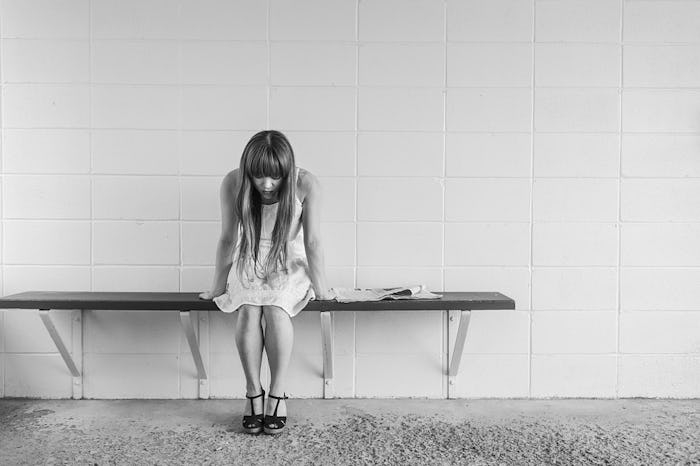When struggling with a mental disorder, like depression or anxiety, it's frustrating when people tell you to "get over it," "calm down," or "stop being dramatic." Unfortunately, that's become a common response to a legitimate struggle for many people. Too often, people feel the need to shrug off symptoms out of fear or because they don't realize there are signs you have a legit depressive disorder and aren't just "moody."
You'd think you'd known if you're suffering from clinical depression and other depressive disorders. But because it can happen slowly and over a long period of time, you don't always see it coming or even grasp what's happening at first. Even worse, many people think that it's just a rough patch, dealing with moodiness.
The reality is that you can try every uplifting suggestion out there, but it doesn't stop the feeling of unhappiness or worry that something is wrong. For women especially, depressive disorders can be worrisome, as women are two times more likely than men to suffer from depression and dysthymia, according to the American Psychological Association. Furthermore, it's misdiagnosed 30 percent to 50 percent of the time. So if you're wondering whether or not some of the "moodiness" or symptoms you're experiencing may point to a depressive disorder, read through the signs below.
1You're Constantly Irritable
I'll be the first to admit I find myself on edge every so often. But constantly snapping at people, feeling on edge, or blowing up over little things is a sign to watch for, according to She Knows.
2You Notice Extreme Weight Fluctuation
It's not uncommon to be a little unsatisfied with your weight, but if you're gaining or losing significant amounts of weight, especially without trying, that's a sign you may be experiencing depression, according to the National Institute of Mental Health (NIMH). Another common symptom to look for that often accompanies weight fluctuation is appetite change.
3You're Consistently Tired
Feeling tired when you've changed up your routine, from lack of sleep, or even on occasion is totally normal. It's when you begin to feel tired all the time that you may want to take note, according to Web MD. Consistent fatigue, insomnia, restlessness, or the urge to constantly sleep is a very common sign of depressive disorders.
4You Drink Every Day
I enjoy my wine just as much as the next person. But when you start relying on it every night, the aforementioned She Knows article noted that you may be turning to alcohol to put off your feelings. You shouldn't need alcohol to get through daily life, and if you feel you do, it's a sign you may be dealing with a depressive disorder.
5You Avoid People Or Activities
According to Help Guide, avoiding social activities and general loss of interest in activities is a major of depression. Additionally, if you've just stopped caring and don't enjoy activities, even when you do partake, you could very easily be dealing with a depressive disorder.
6You're Indecisive
According to the aforementioned She Knows article, the inability to make simple decisions, like what to wear or eat, can be an early symptom of clinical depression.
7You Have Constant Aches
According to the aforementioned NIMH article, aches, pain, headaches, cramps, or even digestive problems that are seemingly without a cause and don't change with proper treatment are a significant sign your body is trying to communicate a depressive disorder. This is especially common in those who tend to brush off their emotions.
8You Have Persistent Negative Thoughts
Consistently negative ad suicidal thoughts are the more serious signs that you're dealing with a depressive disorder, according to the aforementioned Web MD article. If you're experiencing these thoughts, and even if you feel like they're not worth getting help over, reach out to your health care provider or talk to someone.
If you're constantly feeling under the weather or seem to be struggling nonstop, it's important to address the issue, whatever it may be. Sometimes signs like tiredness or headaches are simply just due to everyday life, but if symptoms persist or continue pile on top of each other, talk with your doctor and reach out to a professional for help.
